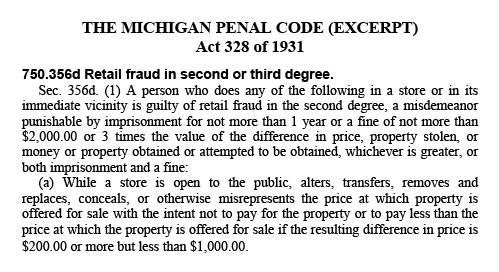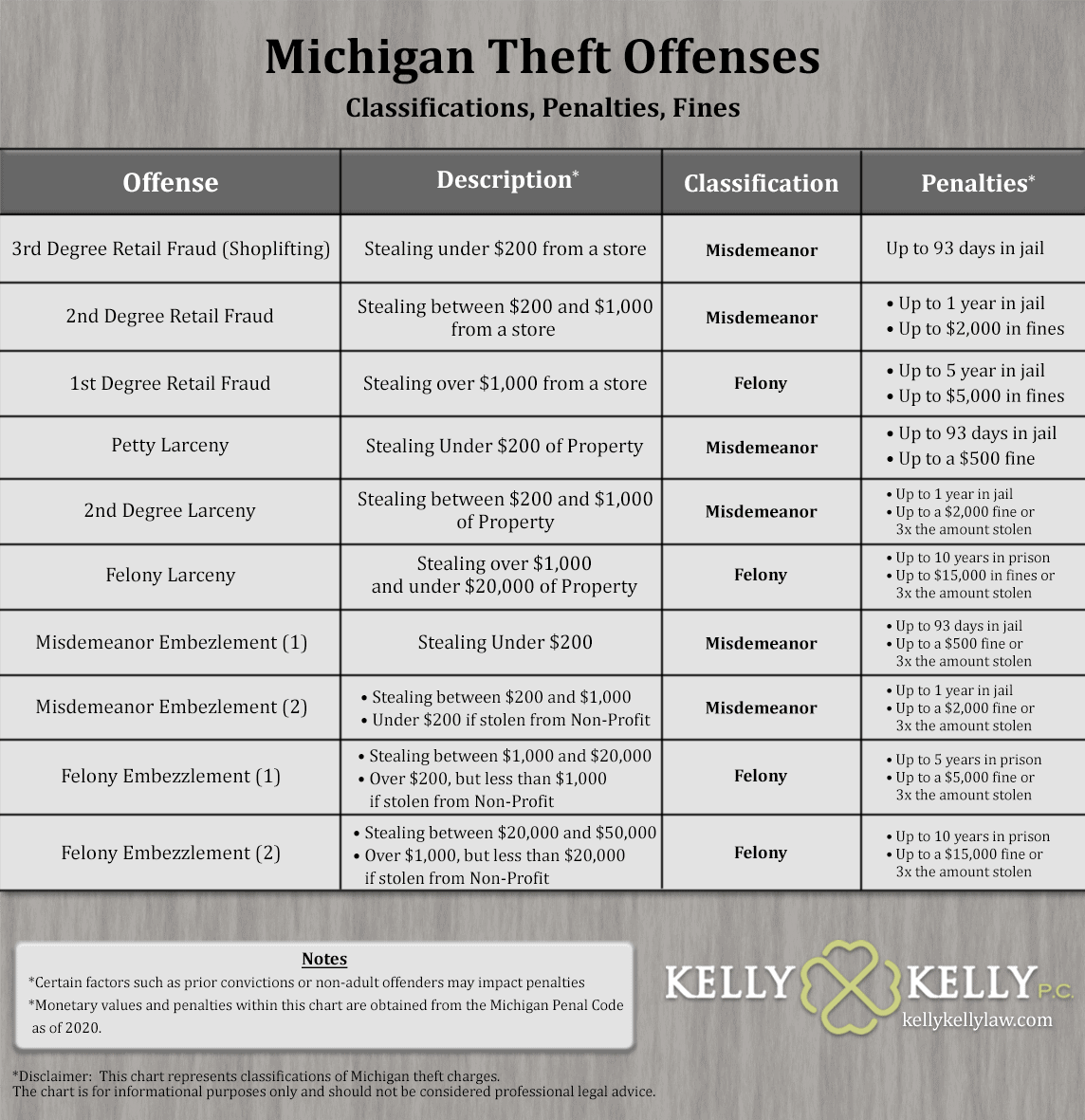Attorney For Theft Crimes in Michigan
The Michigan legal system takes theft crimes very seriously. For instance, when someone is arrested for shoplifting, even if it’s their first offense, they may end up in jail. To make matters worse, a retail fraud conviction is public information and can affect future employment opportunities. Furthermore, depending on the amount of stolen property, you may end up with a felony on your record. Other theft crimes such as larceny, embezzlement, etc. may have similar or more serious consequences such as a prison sentence.
Regardless of the circumstances, if you’re facing allegations of theft, you need to act quickly to protect yourself and your reputation. Being charged with a theft without proper legal defense is a recipe for disastrous consequences that may follow you forever.
If you or someone you know is facing these charges, talk to an experienced theft lawyer at Kelly & Kelly P.C.
Michigan Theft Laws
In Michigan, there are several classifications/types of theft each with varying degrees of penalties. Here are some of the more common types.
- Misdemeanor Theft
- Felony Theft
- Juvenile Theft
- Retail Fraud (Shoplifting)
- Embezzlement
- Larceny
- Identity Theft
- Car Theft
- Credit Card Fraud
- Burglary
- Robbery (Theft by force)
It’s important to note, robbery differs from theft in that robbery involves using force or the threat of force to steal whereas theft simply refers to someone stealing property that doesn’t belong to them. This page focuses primarily on theft crimes.
This chart provides a simplified breakdown of various theft related offenses in Michigan.
Retail Fraud (Shoplifting)
Retail Fraud which is also referred to as shoplifting is the act of stealing property from a store. There are varying degrees of Retail Fraud depending on the monetary value of property stolen and/or or other factors (i.e. prior convictions).
3rd Degree Retail Fraud occurs when the alleged stolen property is valued under $200.
Retail Fraud in the 3rd degree is a misdemeanor punishable by 93 days in jail.
2nd Degree Retail Fraud occurs when the alleged stolen property is valued between $200 – $1,000. Retail Fraud in the 2nd degree is a misdemeanor punishable by up to 1 year in jail and $2,000 in fines.
1st Degree Retail Fraud is charged when the alleged stolen property is valued over $1,000. Retail Fraud in the 1st degree is a felony punishable by up to 5 years in jail and $5,000 in fines.
It’s important to note, being issued a ticket by a police officer is not enough to convict you of the crime itself. Retail Fraud requires proof beyond a reasonable doubt the following elements:
- You took property the store offered for sale.
- You moved the property from its original position.
- The place where you took the item was a store open to the general public, or in the immediate area around the store.
- There was intent to steal the property.
- The place where you took the item was a store open to the general public, or in the immediate area around the store.
- The value of property taken fits the degree of the charge.
Larceny
 Larceny refers to the act of stealing property from another individual or business without the use of force. This offense differs from retail fraud in that the alleged theft isn’t specific to a retail store. For example, larceny may involve someone stealing money from another person’s wallet, or stealing someone’s phone, laptop, etc. There are varying degrees of larceny depending on the monetary value of property stolen and/or or other factors (i.e. prior convictions).
Larceny refers to the act of stealing property from another individual or business without the use of force. This offense differs from retail fraud in that the alleged theft isn’t specific to a retail store. For example, larceny may involve someone stealing money from another person’s wallet, or stealing someone’s phone, laptop, etc. There are varying degrees of larceny depending on the monetary value of property stolen and/or or other factors (i.e. prior convictions).
Petty Larceny occurs when the alleged stolen property is valued under $200. Petty Larceny is misdemeanor punishable by 93 days in jail AND A $500 fine.
2nd Degree Larceny occurs when the alleged stolen property is valued over $200 and under $1,000. Larceny in the second degree is a misdemeanor punishable by up to 1 year in jail and up to $2,000 in fines or 3 times the value of stolen property (whichever is greater).
Felony Larceny occurs when the alleged stolen property is valued over $1,000 and under $20,000. Felony Larceny is punishable by up to 10 years in prison with fines up to $15,000 or 3 times the value of stolen property (whichever is greater).
Embezzlement
In Michigan, the crime of embezzlement focuses on a person in a position of trust who uses that position to obtain a financial benefit without approval or knowledge of an employer or principal. The Michigan Penal Code 750.174 defines Embezzlement as
“A person who as the agent, servant, or employee of another person, governmental entity within this state, or other legal entity or who as the trustee, bailee, or custodian of the property of another person, governmental entity within this state, or other legal entity fraudulently disposes of or converts to his or her own use…” (Michigan Legislature Section 750.174, Act 328 of 1931, Embezzlement)
There are varying degrees of embezzlement depending on the amount of money embezzled, prior convictions and whether or not the money was stolen from a nonprofit.
Misdemeanor Embezzlement – The first level of embezzlement relates to situations where the value is under $200. In this case, those convicted face a punishment 93 days in jail and a fine of $500 or 3 times the amount of money embezzled, whichever is higher. This is the lowest level of embezzlement in Michigan – jail time and fines increase for those who embezzle a higher dollar amount and repeat offenders.
The second level of misdemeanor embezzlement is in situations where the amount embezzled is:
- Over $200 and under $1000 in value
- Under $200 if defendant has prior embezzlement conviction
- Under $200 and victim is non-profit organization nonprofit corporation or charitable organization under federal law or Michigan law.
The punishment for those convicted is up to 1 year in jail and fine of up to $2000 or 3 times the value, whichever is greater.
Felony Embezzlement – This is the most serious type of embezzlement, with harsh penalties. This is divided into two levels, described below.
The first level is applied when the amount embezzled is:
- Over $1000 but less than $20,000
- Over $200 but less than $1000 and defendant has prior embezzlement conviction
- Over $200 but less than $1000 and the victim is a non-profit organization, nonprofit corporation or charitable organization under federal law or Michigan law.
The punishment for those convicted is up to 5 years in prison and $5000 fine or 3 times the value, whichever is greater.
The second level is applied when the amount embezzled is:
- Over $20,000 and less than $50,000
- Over $1000 and less than $20,000 and defendant has two prior embezzlement convictions
- Over $1,000 but less than $20,000 and victim is non-profit organization nonprofit corporation or charitable organization under federal law or Michigan law;
The punishment for those convicted is a prison sentence of up to 10 years and $15000 fine or 3 times the value, whichever is greater.
Talk To A Michigan Theft Lawyer
At Kelly & Kelly, we see many otherwise good people charged with theft related crimes who simply made a bad decision or were put in a compromising situation. Simple misunderstandings can quickly snowball into huge legal problems when someone doesn’t take immediate action to protect themselves with proper legal defense.
If you’ve been arrested, or are being investigated for a theft crime such as retail fraud, larceny, or embezzlement, speak with one of our experienced attorneys today.





